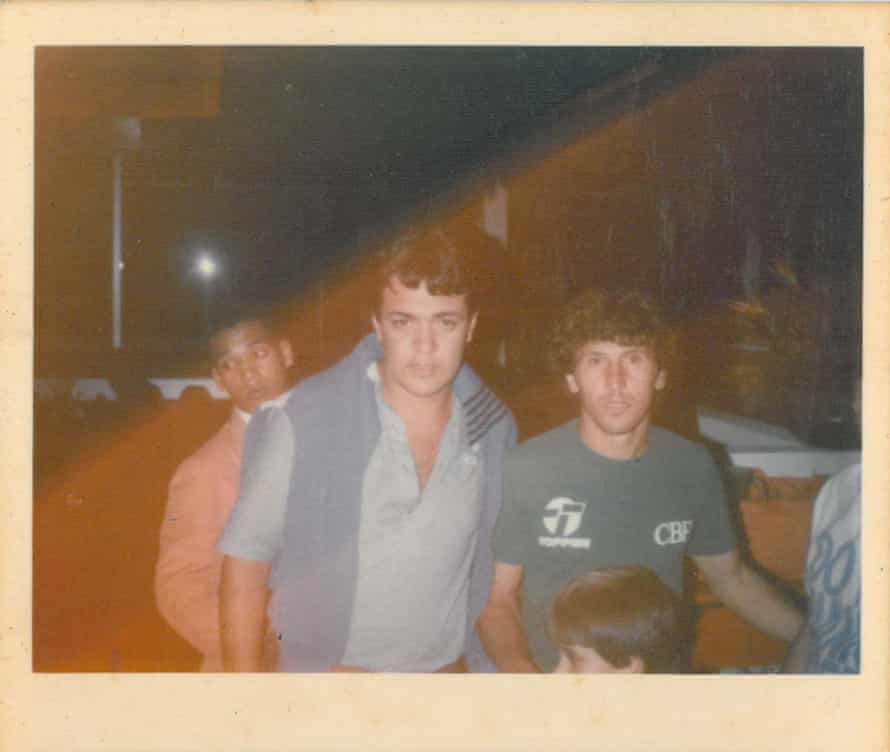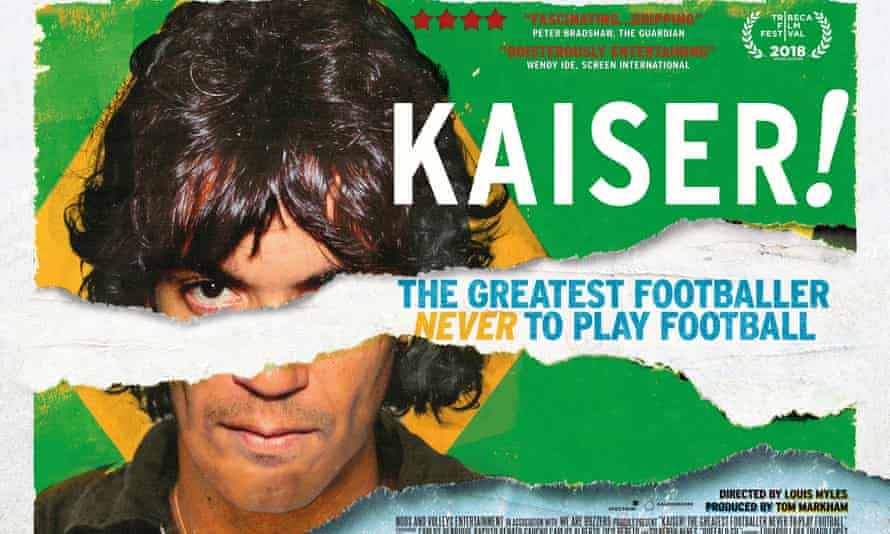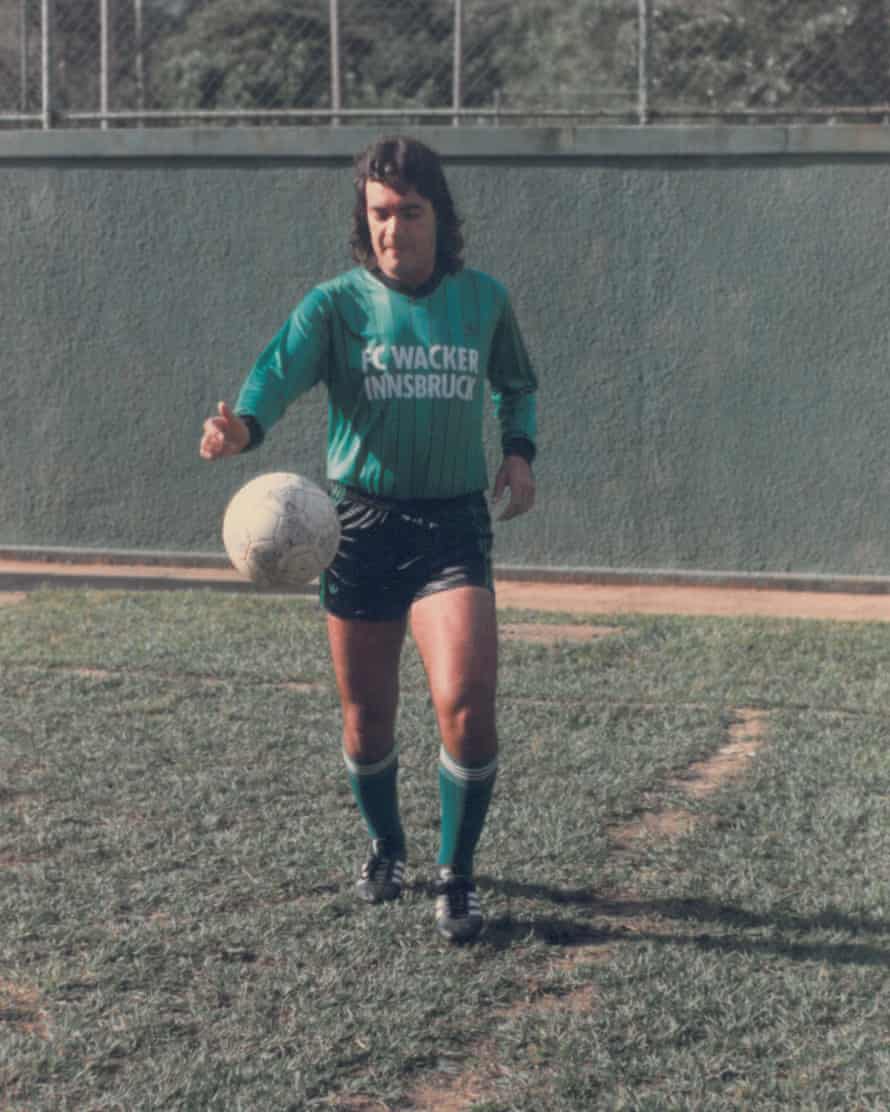A new film tells the story of Carlos Kaiser, who was one of the most famous footballers in Brazil for over 20 years – even though he had no intention of ever kicking a ball
You might know the voiceover at the start of The Big Lebowski. As tumbleweed meanders through Los Angeles, Sam Elliott introduces us to the film’s main character: “Goes by the name of Jeff Lebowski. At least that was the handle his loving parents gave him, but he never had much use for it himself. See, this Lebowski, he called himself ‘The Dude’.”
The Stranger rambles on about this and that until he gets somewhere near the point. “Sometimes, there’s a man. And I’m talkin’ about the Dude here – the Dude from Los Angeles. Sometimes, there’s a man; well, he’s the man for his time and place. He fits right in there. And that’s the Dude.”The forgotten story of … Dundee United’s glory years under Jim McLeanRead more
It’s also Kaiser, in Rio de Janeiro, in the 1980s and 1990s. Carlos Henrique Raposo was the handle his parents gave him but he never had much use for that. This Raposo, he called himself “Kaiser”. And in one ostentatiously bemulleted package, he embodied the roguish charm of one of the world’s most soulful cities. “Rio de Janeiro is a special state,” says Joel Santana, the coach who has won the state championship (the Campeonato Carioca) with all four of Rio’s main clubs. “Cariocas (natives of Rio) are more free, relaxed, fun. The environment is conducive to it. A lot of beach. A lot of samba. A lot of drums. You get into the groove without knowing. A good Carioca is somebody who knows how to live life.”
Kaiser has lived life to the brim. In his pomp he was everything from fixer to gigolo to party planner to gangster’s pet. Most of all, he was football’s finest conman. Renato Gaúcho, one of the finest Brazilian players of his generation, calls Kaiser “the greatest footballer never to have played football”. He had a career spanning more than two decades, during which he was associated with Rio’s four biggest clubs – Flamengo, Fluminense, Botafogo and Vasco da Gama – as well as Bangu, América and a number of overseas teams. Yet throughout his career he went out of his way not to play football. “I wanted to be among the other players,” Kaiser says. “I just didn’t want to play. It’s everybody else’s problem if they want me to be a footballer. Not even Jesus pleased everybody. Why would I?”
His story is so astonishing that, in 2015, a British company bought exclusive rights for a feature-length documentary. It includes interviews with legends of Brazilian football such as Carlos Alberto, Zico, Júnior, Bebeto and Renato Gaúcho – not to mention multiple audiences with Kaiser. His memory is somewhere between selective and defective, and there is an undeniable element of fantasy to his story. As you dig deeper, one thing becomes abundantly clear: a lot of this stuff really did happen.

Piggy in the middle
Kaiser had more front than Copacabana Beach. His staple trick was to make friends with influential people: he would befriend powerful figures at each club, telling them about his impressive football CV. If he was in the mood, he would approach journalists, players and the club owner, constructing a web of lies so elaborate that nobody could remember who had vouched for him in the first place.
In those days, before the internet, nobody was much the wiser. Even if they had the inclination to check – and Rio has never been the most anal of places – they wouldn’t have been able to do so. “Life,” says Kaiser, “is marketing” – and he told his stories with such infectious conviction that it was easy to be swept along. Bebeto, the World Cup-winning striker of 1994, says: “His chat was so good that if you let him open his mouth, that would be it. He’d charm you. You couldn’t avoid it. That would be it.”
In the first training session Kaiser usually suffered a muscle injury that would keep him out for an indefinite period, during which he would hang around the club and become an unofficial morale specialist. “He created a fun, happy and lighthearted mood,” says Alexandre Torres, the former Brazil international and son of Carlos Alberto. “He would tell stories and he would get players dreaming. I think that’s why everybody liked him so much.”
On the few occasions he did train, he had the rare ability to find himself in space. Trouble was, that space was usually as far away from the action as possible. In theory Kaiser was a centre-forward; in practice he was a really false nine.

One team became so frustrated with Kaiser’s injuries that they called in a witch doctor; Kaiser brusquely informed him there are some things even black magic cannot cure and sent him packing. He would do anything to avoid playing or win favour. He paid youth-team members to clatter him in training so that he could fake injury, and gave watching spectators money to sing his name when the club owner was around. Long before Stephen Ireland came up with the idea, Kaiser was committing grannycide: his grandmother was regularly killed off to help him avoid his inanimate nemesis, the football.
Kaiser says he had some talent but chose not to use it. Some interviewees corroborate that, including Jair Pereira, the former Atlético Madrid coach who won more than 20 trophies in his career, although the majority burst out laughing at the suggestion. In Brazil, training sessions would often be preceded by a game of piggy in the middle. “He was completely out of his depth,” Bebeto says. “He would be dashing from one end to the other. Sweating loads! He was knackered before training even started! One day we just said: ‘Get out, Kaiser! Otherwise we’ll end up killing you!”
Kaiser’s most famous – and most dangerous – scam occurred at Bangu, a small club in the West Zone and a place that has the distinction of hosting the first football match ever played in Brazil. In 1985, they came within a penalty shootout of winning the Campeonato Carioca, an achievement that would have registered extremely high on the Leicester Scale. At the time they were owned by Castor de Andrade, Brazil’s premier bichiero (somebody who operates an illegal gambling game), who was routinely described as the most dangerous man in Brazil and was great friends with the Fifa president João Havelange. Castor was not a man to mildly irk, never mind cross. After one match he chased a referee around the pitch, a gun flapping in his back pocket as he attempted to engage the ref in urgent discourse regarding a minor disparity in their interpretation of the laws of the game.
Castor signed Kaiser, prompting a newspaper headline: “BANGU HAS ITS KING”. That headline became famous, and not only because Kaiser showed it to everybody at every opportunity. When he arrived he had the usual injury problems. Castor loved him anyway, because of his cheek, his charisma, his chutzpah – and his apparently endless access to beautiful women. He loved Kaiser’s personality so much that he wanted to see its manifestation on the pitch. One weekend Kaiser was studiously continuing his rehab at 4am in Caligula nightclub when word reached him that Castor had sent an order for him to be on the bench the next day. Kaiser panicked before being reassured by the coach that he would stay as a non-playing substitute.
Bangu had a dreadful start to the match and were soon 2-0 down. Castor sent a message from the stands via walkie-talkie that it was time to unleash the star signing. Kaiser had two choices. He could go on as substitute, in which case he was dead; or he could refuse to go on, in which case he was dead. So he improvised a third option. While warming up, Kaiser heard an opposing fan call him a “long-haired faggot” and used it as an excuse to start a brawl with the away supporters. He was sent off before getting on the pitch.
Kaiser was summoned to see Castor after the game. “God has taken both my parents away but gave me another father who they accused of being a crook,” he sniffed. “So I lost it and went for them. But don’t you worry because my contract is up in a week and I’ll be off.” Castor gave him a pay rise and a contract extension.
That day, like every other, Kaiser lived on instinct and in the moment. He didn’t live for tomorrow; he didn’t even live for later today. His life has been a never-ending hustle predicated on a series of small, instinctive scams that make up one gigantic scam. And that’s why so many people love him.

The good 171
In Brazil, 171 is the article in the penal code that deals with scammers and confidence tricksters; thus such people are known as 171s. Nearly everyone goes out of their way to tell you Kaiser was a good 171. “I don’t know of anybody who has a story showing Kaiser as untrustworthy,” said Carlos Alberto, the captain of Brazil’s 1970 World Cup winners.
In terms of effectiveness, he was a great 171. There were all the low-level scams – losing his wallet, the cash machine swallowing his card – so that he would never have to pay for a meal. This would often be quite a bill. Kaiser goes through phases of binge eating and binge dieting and on one occasion the staff at a pizza restaurant counted as he went through 70 (S-E-V-E-N-T-Y) slices of pizza. Not content with redefining football, Kaiser redefined restaurant culture by introducing the free all-you-can-eat buffet. “I could be penniless,” he says, “but if I had to take a girl out to dinner in the best place in Rio I could.”
He had no money but he was a self-made VIP. Alexandre Torres recalls Kaiser asking his father – Carlos Alberto, the captain of the greatest football team in history – whether he would like to stay in the stunning resort town of Búzios, Brazil’s answer to St Tropez, over Christmas and New Year. Carlos Alberto knew that even he would not be able to get a reservation at such short notice but decided to call Kaiser’s bluff. Ten minutes later Kaiser came back with a hotel name and a contact, and Carlos Alberto stayed there for five days.

Carnival
Rio is one of the most unfettered places in the world. The most obvious manifestation of this is in the physical act of love, yet the relationship between sex and misogyny has often been on the unpleasant side of uncomfortable. “My whole life has revolved around sex,” Kaiser says. “There are no other hobbies. If I went to a nightclub I’d spend 10 minutes chatting up a girl and then leave. You just take her into the first bathroom and the first available cubicle, give her one then leave. This all comes from the culture in which I was raised. I came from a very poor culture among ignorant people, so I had it in my head that to have sex you needed to be macho. It’s not something I’m particularly proud of.”
He used his status to chat up women. Sometimes he would show a grainy VHS of a namesake scoring brilliant or vital goals. He was almost in a grainy VHS himself when he went along to a porn audition to support his cousin and made such an impression that he nearly ended up in the film.

Kaiser modelled himself on his idol and best friend, the superstar Renato Gaúcho, with sunglasses that never came off and an extravagant mullet that he would constantly flick behind his ears. Renato symbolised the last golden age of Brazilian domestic football, when the greats spent the majority of their careers at home and the game had not been infected with professionalism. Renato, Kaiser and another forward called Gaúcho were inseparable, while he regularly hung out with Romário, Edmundo and even Diego Maradona, who often came to Rio Carnival.
Renato is the superstar Europe never knew: a tall, elegant winger who was almost too hunky to function. Bebeto thinks he was as good as Lionel Messi and Neymar. Renato’s time might have been 1986 but he was kicked out of the World Cup squad by Telê Santana, a lightning rod for a number of players who sneaked out of the team camp for a night out.
Renato had a short period at Roma, when professionalism and the lack of beaches sapped his spirit. The rest of his career was spent in Brazil. Even though the team that won the World Cup in 1994 is remembered with an asterisk because of their conservative style of play, domestic football was as expressive as ever. This was a team when Jogo Bonito was a philosophy rather than an advertising slogan.
In 1995, during a particularly glamorous race for the Rio state championship, Renato, Romário and Túlio had a playful, ongoing public argument about who was the King of Rio. Renato won the argument with his legendary “belly goal” to win the final of the Campeonato Carioca for Fluminense against Romário’s Flamengo. There was another contender for the crown. These days Kaiser is in his 50s and works as a fitness trainer for women – but his legend endures. “Those three were just squabbling,” says Alexandre Torres. “They wanted to usurp a guy who was impossible to dethrone. The real king of Rio was Kaiser.”